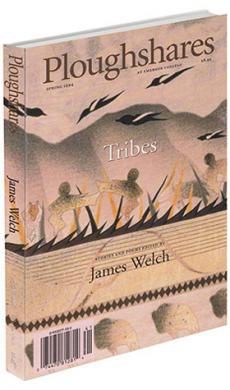rev. of The Open Boat: Poems from Asian America ed. by Garrett Hongo
The Open Boat: Poems from Asian America
An anthology edited by Garrett Hongo. Anchor Books, $12.00 paper. Reviewed by Stewart David Ikeda.
In this time of multicultural vogue, Garrett Hongo’s extraordinary poetry anthology,
The Open Boat: Poems from Asian America, makes an intelligent statement about the limitations of limits, the perils of essentialism, and the urgent necessity for protest art to remain dynamic. Even the shaky construct of “Asian America” itself is challenged in the anthology, for the works of these thirty-one poets defy reduction to any single, “representative” cultural beat. Readers won’t find “the Asian American Experience” rendered here, but thirty-one such experiences crafted to near perfection.
And it is a distinctly American book. “We are already upon the shore,” writes Hongo. More of the baby bust than boom, his generation’s rootedness affords it the luxury of imaginative travel unavailable to ancestors. The poems hydroplane beyond the California-centric, immigration-era settings that have obsessed earlier writers, with younger poets such as Chicagoan Li-Young Lee maintaining only imaginative ties to Asia: “I’ve never been in Peking, or the Summer Palace / nor stood on the great Stone Boat to watch / the rain begin on Kuen Ming Lake.” David Mura takes a haunting empathetic journey to post-Bomb Hiroshima as a radiation victim in “Hibakusha’s Letter,” and Jessica Hagedorn — in the voice of Yolanda, a dominatrix-missionary — airbuses to Europe (“what / a creature / all dis history / and no future”) to enlighten Amsterdam with the gospel of American soul, “some real rock ‘n’ roll . . . some real black.” Like their poems, the poets themselves span and expand geographical frontiers. Whereas “Asian
American” in earlier anthologies meant “West Coast Japanese, Chinese, and Filipino American,” Hongo has enlisted a pleasingly motley, often multiracial crew, extending the literature’s origins to uncharted lands: Kashmiri, Indian, Sri Lankan, and Indonesian America; and to even more exotic locales like Minneapolis, Chicago, and Philadelphia.
With the mixed races, geographies, and concerns of these poets, the anthology might first appear random and messy, particularly to essentialists. In addition, Hongo has “No Name Writers” rubbing elbows with Critics’ Circle winners, culling their poems from literary journals, and although he yokes together old antagonists like Maxine Hong Kingston and Lawson Inada, he lifts them out of traditional contexts, rather than attempting to reignite their feud. Hongo is obviously trying to embrace younger readers as well, making the anthology intellectually and financially accessible, and contemporary without being trendy (no bug-eyed dragons smolder on its cover; it exoticizes nothing). But Hongo’s organizing principles in compiling this anthology are far from whimsical, nor are they designed merely to attract a mainstream audience. While sharing a certain consciousness of history and race in America, what ultimately binds these poets together are passionate pens, a fresh perspective, and forward motion.
Asian America has long been imprisoned within a skewed history of (self-) oppression, confusion, misinterpretation; if not externally defined as peopled with yellow demons or ultra-white nerds, its obsessions often locked its imagination in internment camps and Chinatowns. Either way, “the Experience” has been read as what was
done to Asian Americans, not what they
did. “We write,” Hongo argues, “about violence to women, about the paintings of Utamaro and Willem de Kooning, about plantation workers and picture brides, about factory work and the pleasures/dangers of sex. We write about our Eurasian children . . . we write about food and family, about what we hold sacred and what we deem profane.”
As such, this important book contains a dazzlingdisplay of little-known personal, not collective, cultures. The diversity of these songs — sociological, cultural, political, religious, artistic — creates a fascinating American symphony in the only language equipped to convey what we direly need to know here, in America, today. In its ambitious scope and inclusiveness — its openness —
The Open Boat sails past horizons of what American literature has been to explore what it will be.
Stewart David Ikeda had a short story included in the Spring 1993 issue of Ploughshares.
He currently lives in Madison, where he teaches creative writing and Asian American literature at the University of Wisconsin.

